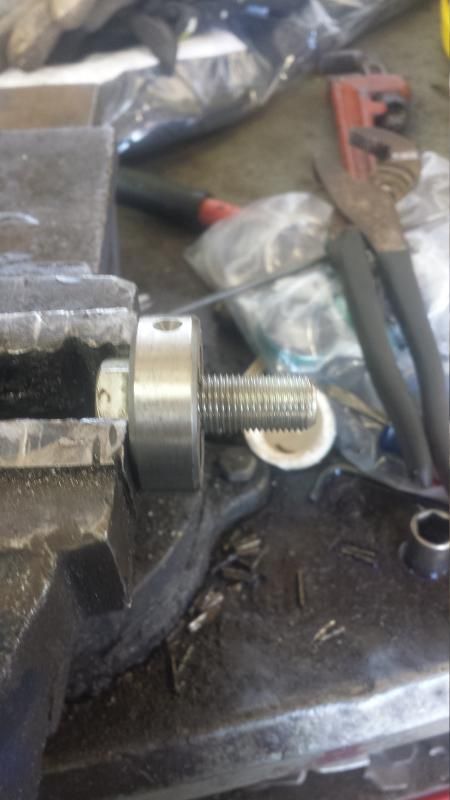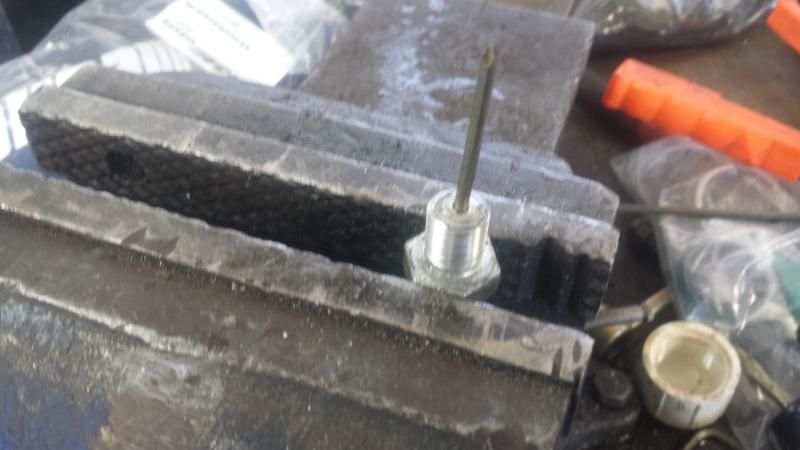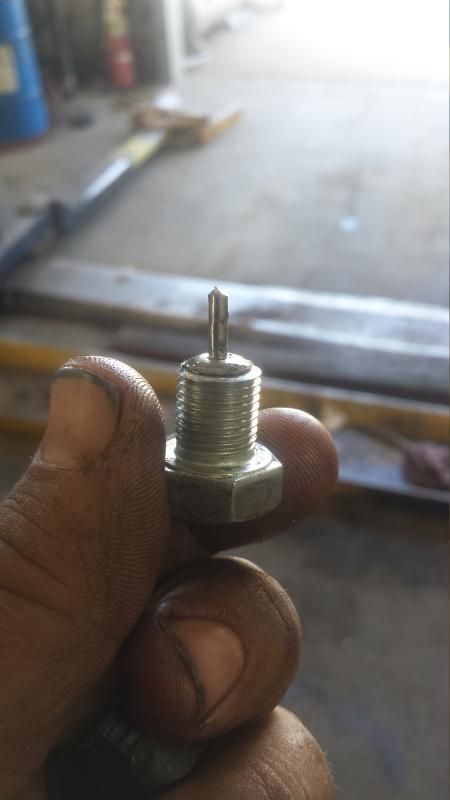
 |
Register or Log In To remove these advertisements. |
|
|
|
|||||||
 |
|
|
Thread Tools | Display Modes |
|
|
|
|
#1 |
|
Registered User
Join Date: Jan 2014
Location: Sacramento,California
Posts: 696
|
question about bleeding new brake system..
Hey guys, I swapped in a front disk brake system from an 85 c10 in to my 68. I used everything including the front soft and hard lines, the master cyl, booster and prop valve. I was wondering if there is anything special I need to do while bleeding, I know its rr, lr, rf, lf but I thought I remembered my dad saying something about holding the button on the prop valve if I was replacing something, but it's been a long time. Thanks in advance.
__________________
Built not bought! My dad always tried to convince me HEI was pointless! Welding is a lot like sex, you don't have to be great with the rod as long as you thoroughly prep the surface and your good at grinding  My build : 68 C10 Short Bed Conversion |
|
|

|
|
|
#2 |
|
Registered User
Join Date: Jul 2012
Location: Marysville, WA
Posts: 298
|
Re: question about bleeding new brake system..
Unless you changed the side that the rear line runs down, left rear is furthest away and should go first. On most anything else you would go rr first like you were thinking. It should be lr, rr, rf, lf for this truck.
Adam |
|
|

|
|
|
#3 |
|
Registered User
Join Date: May 2011
Location: Fort Pierce, FL
Posts: 430
|
Re: question about bleeding new brake system..
Is the brake bleeding on a 1985 C-10 different than it was in previous years? According to the 1972 Chevrolet Light Truck Service Manual, you bleed the cylinder or disk CLOSEST to the master cylinder. They go on to explain that that eliminated the possibility of air being trapped in the cylinder farthest. The sequence listed in the Service Manual is LF (drivers side), RF, LR, RR. I also have Service Manuals for 1972 Oldsmobile and 1970 Pontiac that have the identical sequence for bleeding brakes, always starting closest to the master cylinder. I'm not sure how much it really matters, but that is what the manuals say.
|
|
|

|
|
|
#4 | |
|
Registered User
Join Date: Jul 2012
Location: Marysville, WA
Posts: 298
|
Re: question about bleeding new brake system..
Quote:
|
|
|
|

|
|
|
#5 |
|
Registered User
Join Date: May 2011
Location: Fort Pierce, FL
Posts: 430
|
Re: question about bleeding new brake system..
How is the left rear the furthest away? The left is the drivers side, which is closer to the master than the right side, which is the passenger side. We are talking about American truck with left hand drive, aren't we?
|
|
|

|
|
|
#6 |
|
Senior Member
Join Date: Jan 2003
Location: daytonabeach
Posts: 22,956
|
Re: question about bleeding new brake system..
not if you measure the distance of the brake lines
__________________
71c-10 350/2004r/4:11 lowered3/4 longbed/dead by hurricane MEANING OF DEATH::::: SOMEBODY ELSE GETS YOUR STUFF DONT BELIEVE EVERYTHING YOU THINK TAKE MY ADVISE;I DON'T USE IT ANYWAY |
|
|

|
|
|
#7 | |
|
Registered User
Join Date: Jan 2014
Location: Sacramento,California
Posts: 696
|
Re: question about bleeding new brake system..
Quote:
I did manage to find this plethora of information at cpp though, chack it out http://www.classicperform.com/TechBo...t.htm#testprop
__________________
Built not bought! My dad always tried to convince me HEI was pointless! Welding is a lot like sex, you don't have to be great with the rod as long as you thoroughly prep the surface and your good at grinding  My build : 68 C10 Short Bed Conversion |
|
|
|

|
|
|
#8 |
|
Registered User
Join Date: May 2011
Location: Fort Pierce, FL
Posts: 430
|
Re: question about bleeding new brake system..
Now that you mention it, the right rear may be farther away from the master, but aren't the brake line lengths equal? Unlike the front that has 2 lines coming off the proportioning valve and the right brake line is much longer, the rear has only one line from the proportioning valve. They separate into two lines at the differential. That junction is in the middle, so the lines from there, out to the wheel cylinders would be the same, wouldn't they? Unless the junction is a little off center toward the right rear wheel.
|
|
|

|
|
|
#9 | |
|
Registered User
Join Date: Jul 2012
Location: Marysville, WA
Posts: 298
|
Re: question about bleeding new brake system..
Quote:
|
|
|
|

|
|
|
#10 |
|
Registered User
Join Date: May 2011
Location: Fort Pierce, FL
Posts: 430
|
Re: question about bleeding new brake system..
Okay. That I did not remember. Or is it different on the 1972 that I am familiar with?
Last edited by brown7373; 09-17-2014 at 03:23 PM. Reason: addition |
|
|

|
|
|
#11 |
|
Registered User
Join Date: Jan 2014
Location: Sacramento,California
Posts: 696
|
Re: question about bleeding new brake system..
so I figured out, that in order to get a really good bleed using my vacuum bleeder, I would need to neutralize the proportioning valve. Every time I started to bleed the rears, the prop valve would audibly pop shut and I would stop sucking fluid. So I looked at a cutaway of a prop valve and found that in the center there is like an hour glass shaped v where the warning light sensor goes, and I figured if I could take out the sensor, and insert something to wedge in the center of that v, the valve wouldn't be able to slide back and forth, allowing me to rapidly bleed both the front and rear brake systems. And, since there are o-rings on wither side of this v, there would be no fluid leakage, and also no air leakage in to the system if I remove the sensor after it has been bled. So I decided to make a tool for this application. I guess they sell them, but I am limited on time and money.... so I made one, and it was easy.
In my case the sensor was a 1/2 x 20 thread pitch, which is a 1/2 fine thread. I had some at the shop but they were too long, so I threaded on a tap all the way down to the base of the bolt, and then cut the rest of the bolt off, then backed off the tap to repair the threads I cut through. Then I center punched (that's important to keep the bit straight) and drilled a hole in the end of the bolt. I then inserted a 3/16 sheet metal rivet and used a socket and hammer, and tapped it down in until it sat flush against the bolt tip I did not use the rivet gun to tighten it in, otherwise it will cut the shank, and the shank is the piece we need. I then compared the length of the sensor, and clipped the rivet shank to the same length. I threaded the bolt into the sensor hole on the prop valve till I felt it snug against the valve inside, and then I proceeded to bleed the brakes, worked like a charm. here are some pics of the tool...   
__________________
Built not bought! My dad always tried to convince me HEI was pointless! Welding is a lot like sex, you don't have to be great with the rod as long as you thoroughly prep the surface and your good at grinding  My build : 68 C10 Short Bed Conversion |
|
|

|
|
|
#12 |
|
Registered User
Join Date: Aug 2006
Location: Redmond, WA
Posts: 6,334
|
Re: question about bleeding new brake system..
The 1970 manual is ambiguous to me. It reads
"The sequence of bleeding is to bleed the cylinder next in line (distance) from the main cylinder until all cylinders have been purged of air". Doesn't say next in line further or closer though! I read it as nearest to furthest, but it wasn't 100% clear to me. For 1972 they got more specific and even gives reasons: "The correct sequence of bleeding is to bleed wheel cylinder, either front or rear system, nearest master cylinder first. This sequence expels air from lines and wheel cylinders nearest the master cylinder first and eliminates the possibility that air in a line close to the master cylinder may enter a line farther away after it has been bled." Unless that change was made due to the addition of disc brakes between 70 and 72, I imagine that should apply to all of our trucks. And yes, back left is furthest away as said above because the line travels to the rear axle and T's on the right hand side of the back axle, making the left further away.
__________________
1970 GMC Sierra Grande Custom Camper - Built, not Bought 1969 Pontiac 2+2 427/390 4-speed Coupe 1969 Pontiac 2+2 427/390 4-speed Convertible |
|
|

|
 |
| Bookmarks |
|
|